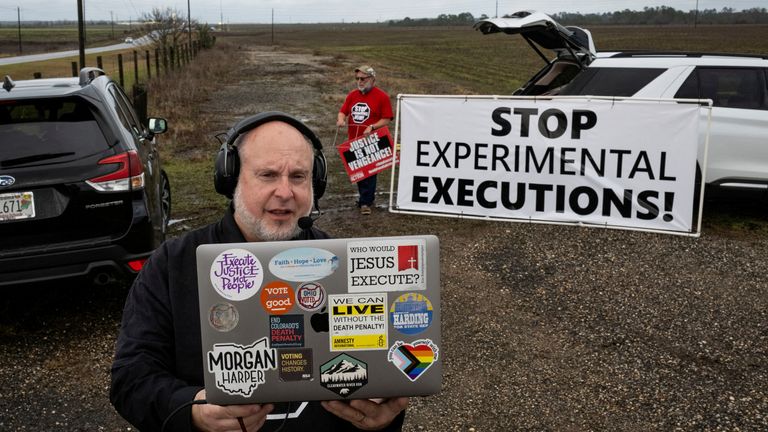
A prisoner in Alabama has become the first inmate in the world to be executed with nitrogen gas.
Convicted murderer Kenneth Smith, 58, was put to death after the US Supreme Court declined a legal bid to halt his sentence.
His official time of death was 8.25pm on Thursday (2.25am UK time).
According to witnesses, the execution took about 22 minutes and Smith appeared to remain conscious for several minutes.
For at least two minutes, he appeared to shake and writhe, sometimes pulling against the restraints. That was followed by several minutes of heavy breathing, until breathing was no longer perceptible.
State authorities had predicted unconsciousness within seconds and death within minutes.
In a final statement, Smith said: “Tonight Alabama causes humanity to take a step backwards… I’m leaving with love, peace and light.”
He made the ‘I love you sign’ toward his wife and other family members who were witnesses. “Thank you for supporting me. Love, love all of you,” Smith said.
Humane death or lethal experiment? How nitrogen execution works
The use of nitrogen gas is highly controversial and critics say it’s cruel and experimental. It had never been used before anywhere.
It involves clamping a mask tightly to the face, covering the mouth and nose.
The mask is then fed with nitrogen gas. The person continues to breathe normally, but with no oxygen present the body gradually shuts down until death occurs – effectively they are suffocated.
Reverend Jeff Hood, who witnessed the execution, said the reality did not match Alabama’s predictions of a quick death.
“We didn’t see somebody go unconscious in 30 seconds. What we saw was minutes of someone struggling for their life,” he said.
“Heaving back and forth, we saw spit, we saw all sorts of stuff develop from the mask. The mask was tied to the gurney, ripping his head back and forth over and over again.”
Smith was convicted in the 1988 murder-for-hire killing of Elizabeth Sennett.
Prosecutors said he was one of two men who were each paid $1,000 to kill Ms Sennett on behalf of her pastor husband, who was deeply in debt and wanted to collect on insurance.
She was found with eight stab wounds to the chest and one in each side of her neck.
The other killer, John Forrest Parker, was executed in 2010.
In a statement, Alabama state governor Kay Ivey said: “On March 18, 1988, 45-year-old Elizabeth Sennett’s life was brutally taken from her by Kenneth Eugene Smith.
“After more than 30 years and attempt after attempt to game the system, Mr Smith has answered for his horrendous crimes.
“The execution was lawfully carried out by nitrogen hypoxia, the method previously requested by Mr Smith as an alternative to lethal injection.
“At long last, Mr Smith got what he asked for, and this case can finally be put to rest.
“I pray that Elizabeth Sennett’s family can receive closure after all these years dealing with that great loss.”
‘Mom got justice’
“Alabama has achieved something historic,” said state attorney general Steve Marshall.
“Like most states, Alabama has made the judgement that some crimes are so horrific that they warrant the ultimate penalty.
“But anti-death-penalty activists have worked to nullify that moral judgement through pressure campaigns against anyone assisting states in the process.
“They don’t care that Alabama’s new method is humane and effective, because they know it is also easy to carry out.”
Reverend Hood said Smith had a final meal of T-bone steak, hash browns, toast and eggs in steak sauce.
Mike Sennett, the son of Smith’s victim, spoke to media after the execution.
“Nothing happened here today is going to bring Mom back. It’s kind of a bittersweet day,” he said.
“We are not going to be jumping around. whooping and holler, hooray and all that… I’ll end by saying Elizabeth Dorlene Sennett got her justice tonight.”
Smith’s execution comes after he survived a botched lethal injection in 2022 when officials tried unsuccessfully for hours to put an intravenous line into his body.
The incident helped prompt a review of the state’s death penalty procedures.
The Supreme Court justices declined to uphold Smith’s legal challenge that claimed a second execution attempt – after the first failure caused him severe trauma – would violate the US Constitution’s 8th Amendment protections against cruel and unusual punishment.
However the decision was not unanimous, with three justices voting to halt the execution.
“Having failed to kill Smith on its first attempt, Alabama has selected him as its ‘guinea pig’ to test a method of execution never attempted before,” Justice Sonia Sotomayor wrote, saying she would have granted the injunction.
“The world is watching.”
Just minutes before the execution was carried out, the Supreme Court refused for a second time to intervene.

















